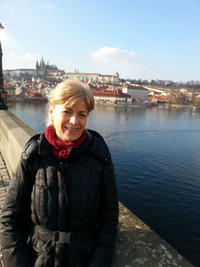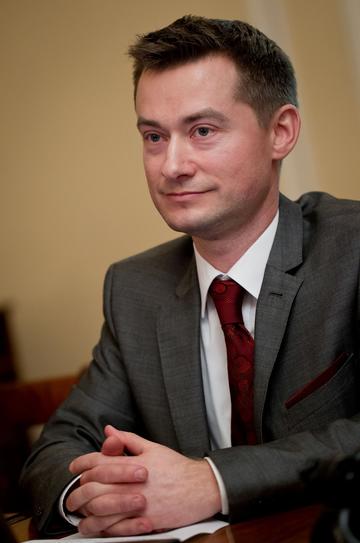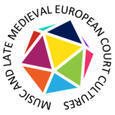ASSOCIATE PROJECTS
The following researchers pursue independent projects on late medieval court cultures that synergize with the work of the MALMECC team. Their support as speakers and contributors to discussions is greatly valued by the project.
Soterraña Aguirre Rincón

Soterraña is Professor of Musicology at the University of Valladolid (Spain). She is also responsible for the Interuniversity Doctoral Programme in Musicology (Universidad Complutense de Madrid and University of Valladolid). She has been the director of research projects that have studied The World of Urban Music under the Crown of Castile (XV-XVII) [2006-2009] and Music and Culture in the Kingdom of Castile (XV-XVII) [2011-15]; and, in cooperation with Prof. John Griffiths, Urban soundscape in Renaissance Spain (2007-2010). She is currently the coordinator of a team of seventeen members dedicated to study The Renaissance Musical Work: Foundations, Repertories and Practices, a project funded by the Ministry of Economy, Industry and Competitiveness of Spain (http://contrapunto.uva.es/).
Soterraña collaborated with the MALMECC project during the 2019-20 academic year, studying a collection of songs in Spanish that reached an unusual diffusion in Italian, Franco-Flemish, German, Portuguese and Castilian courts at the end of the Middle Ages and beginnings of the early modern era. She focused on the sociocultural analysis of the earliest manuscripts which contain them, particularly Bologna Q16 and Oxford 831, the latter preserved in the Bodleian Library.
Ingrid Ciulisová
Ingrid Ciulisová is a Senior Research Fellow in Art History at the Art Research Centre of the Slovak Academy of Sciences (Institute of Art History) in Bratislava. Her interests encompass the fields of late Gothic and early modern art in Europe as well as the historiography of art history.
She has published on art in the Low Countries, the history of art collecting, the history of art history and the preservation of monuments. In addition to numerous articles, such as ´Art collecting of the Central-European aristocracy in the nineteenth century: The case of Count Pálffy´(Journal of the History of Collections, 2006), ´Memory and Witness: ´Translated Images´´ (Revue Belge d’Archéologie et d’Histoire de l’Art, 2009), and ´Dvořák’s pupil Johannes Wilde (1891–1970)´ (Journal of Art Historiography, 2016), her publications include two monographs: Paintings of the 16th-Century Netherlandish Masters: Slovak Art Collections (2006), and Men of Taste: Essays on Art Collecting in East-Central Europe (2014). Recently she has edited and co-edited The Habsburgs and their Courts in Europe, 1400–1700: Between Cosmopolitanism and Regionalism (together with Herbert Karner and Bernardo J. García García) (2014), and Artistic Innovations and Cultural Zones (2015).
In 2018 Ingrid was awarded a Marie Curie-Skłodowska Fellowship. During her tenure in the Department of History of Art of Oxford and a Research Associate at Corpus Christi College (2018-20), Ingrid was an associate of the MALMECC project, pursuing her current research project on the power of marvelous objects possessed by the fourteenth-century Holy Roman Emperor, Charles IV of Luxembourg. Together with Karl Kügle and Prague medievalist Václav Žůrek, Ingrid is editing an essay volume on The Luxembourgs in Europe in 2020-21 as one of the outcomes of both her fellowship and the MALMECC project.

Paweł Ganczarczyk

Paweł Gancarczyk is Associate Professor in the Institute of Art of the Polish Academy of Sciences (Warsaw). He is Head of the Department of Musicology as well as Editor-in-Chief of the quarterly Muzyka. His main areas of research include the musical culture of Central Europe in the 15th and 16th centuries, manuscript studies, and early music printing. Recently he published La musique et la révolution de l’imprimerie: Les mutations de la culture musicale au XVIe siècle (Lyon 2015; recipient of the 2016 Prix des Muses, France) and edited Ars musica and its context in medieval and early modern culture (Warsaw 2016). In 2016-2019 he was Principal Investigator of the Warsaw team in the HERA-funded project Sound Memories: The Musical Past in Late-Medieval and Early-Modern Europe ( www.soundme.eu).
Since June 2019, Gancarczyk is Principal Investigator of the three-year project Music in the Teutonic Order State in Prussia: Sources, Repertoires, Contexts funded by the National Science Centre, Poland. The aim of the research project is to establish the extent to which the musical culture of the Teutonic Order was a unique phenomenon resulting from the specific character of the monastic state and its ideological and political goals. Together with Piotr Ziółkowski (PhD student), Gancarczyk explores the music associated with the cult of the Blessed Virgin Mary and the European contexts of the culture of the Teutonic Order State. An important aspect of this research is the musical life at the court of the Grand Master and the issue of travelling musicians in the late Middle Ages. The project will result in a doctoral thesis and a series of articles and conference papers.
The skyline of the Ghent altarpiece




